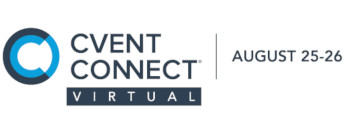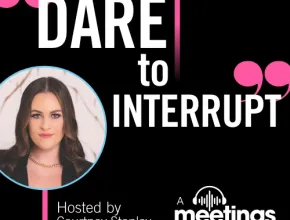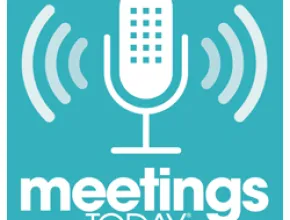Cvent Execs Talk Trends and CONNECT Virtual
Top Cvent execs Brian Ludwig and David Quattrone talk with Meetings Today's Tyler Davidson about how the meetings tech giant pivoted to virtual for its big annual conference and is expecting up to 40,000 attendees.
Ludwig and Quattrone also dive deep to give their predictions about the direction of the meetings and events industry in this time of pandemic and beyond.
Listen to this Meetings Today Podcast to find out more.
 Enjoying this episode? View more episodes of the Meetings Today Podcast!
Enjoying this episode? View more episodes of the Meetings Today Podcast!
Read the transcript below:
[Start transcript]
Tyler Davidson: I'm Tyler Davidson, vice president and chief content director of Meetings Today, and joining us today is Brian Ludwig, senior vice president of sales, and David Quattrone, co-founder and chief technology officer of Cvent, the technology giant. Thanks for joining us, gentlemen.
Brian Ludwig: Thank you, Tyler. Happy to be here.
David Quattrone: Yeah. Thanks for having us. Appreciate it.
Tyler: Thank you. You have your big CONNECT conference coming up. And I've been to a few of them in Vegas, and they're always really well done, and a lot of movers and shakers and a lot of people there. But it's all virtual this year, right?
 Brian: That's right. That's right. We're actually anticipating 35,000 to 40,000 attendees, fully virtually. And I was just going to point out we're going to be doing another virtual CONNECT in Europe in October as well.
Brian: That's right. That's right. We're actually anticipating 35,000 to 40,000 attendees, fully virtually. And I was just going to point out we're going to be doing another virtual CONNECT in Europe in October as well.
(Photo: Brian Ludwig, senior vice president of sales with Cvent)
Tyler: So am I correct, this is going to represent the launch of your new engagement hub at Connect, coming up.
David: Yeah, we're going be delivering through the AttendeeHub engagement tool for our virtual CONNECT`. It's exciting to see such a larger number of people be able to attend this year because the virtual delivery mechanism allows us to go out there and reach a larger audience, and then have individuals participate and interact with our speakers and technology folks at the event itself. So we're very excited about the broader reach this year.
Tyler: And it is almost a natural for you because you're really, a technology company—and wow, those numbers kind of are amazing, you said 30,000 to 40,000 people. This whole industry is in an odd period now, where live meetings are pretty stagnant. A lot of people are going to virtual and hybrid. What are your impressions of going virtual for this? And what sort of advantages does it bring for Cvent?
Brian: Yeah, I could take that. A whole bunch of advantages. Frankly, Dave just alluded to it a little bit. The numbers—when there's no travel, clearly it's easier for us to expand the numbers.
And it's not just Cvent; we're helping to manage many virtual events—actually thousands upon thousands; 60,000 so far this year. We're helping our customers do virtual events, and many of them are seeing the same thing. They're seeing three, four or five times the number of registrants versus the in-person version that they had before.
Now, we're big believers that in-person events will come back and everyone's going to pivot, again, into a hybrid model. And we think that the virtual, it will kind of be a gateway drug, if you will, into in-person. So I think people will keep a virtual element to their events for some time, if maybe not forever. But a lot of the folks that dip their toe in the water with the content and the brand will be interested in attending in person, maybe in 2021, maybe in 2022.
But either way, the exposure that brands are able to get with virtual is going to lead to greater and more engaged attendees even in person down the line.
[Related: Just the Facts: Cvent]
 David: Right, and the way that the AttendeeHub application's kind of modules is designed, even in face-to-face events or hybrid events, that community that is around delivering a virtual event is also used leading up to an event, so you can have interactions and engagement before a traditional event were to take place, or to do follow-up in community interaction and engagement/content delivery in community activities, post an event taking place in a more traditional face-to-face manner.
David: Right, and the way that the AttendeeHub application's kind of modules is designed, even in face-to-face events or hybrid events, that community that is around delivering a virtual event is also used leading up to an event, so you can have interactions and engagement before a traditional event were to take place, or to do follow-up in community interaction and engagement/content delivery in community activities, post an event taking place in a more traditional face-to-face manner.
(Photo: David Quattrone, co-founder and chief technology officer of Cvent)
So, a lot of the way we've been able to turn this around as quickly as we have is because we've been investing around what you have with Engagement Hub leading up to what's going on this year.
And that allows us to bring additional features function around the various types of events you can do, whether it's face to face, hybrid or 100% virtual.
Tyler: I guess there's a saying that there's opportunity that come sometimes comes through adversity, and it really sounds like you will have more opportunities in the future to build your client base. And then those clients will have more opportunities after the event, well before, during and after the event, to possibly make more revenue through the virtual and hybrid options?
Brian: Yeah, I think that's a very, very fair statement. I think we think we're well positioned for those folks that are intent on virtual right now, which makes a lot of sense, but then as people pivot back to hybrid and in-person, we believe our toolset for 20 years now is really in a great spot to capitalize on safe, in-person meetings.
We have a new sourcing that showcases properties that have taken more serious safety measures. We have diagramming tools to lay out spaces and tables six or eight feet apart, whatever makes sense for that organizer. We have tools to do contactless check-in and badging, and to track how many people are in each breakout room, right?
If I've designed the space to only hold 60, well, we don't want to let person 61, 62, 63 come in. So we have tools to really safely handle all in-person and hybrid events as those reemerge.
Tyler: Yeah, I was just at an event Wednesday, in Dallas, ALHI held, and it was it was an in-person event and they had all the social distancing, all the protocols. And I think a general sort of impression was that planners need to see this, and they need to experience it. They need to know what it looks like, what it feels like.
And I was just wondering what your impressions are, and what you think some of the challenges are going to be coming up for in-person meetings as they hopefully unfold faster in the near future.
David: Yeah, I think some of the things that Brian was talking about. Really kind of kind of diagramming it out and getting the communication out. Planning ahead of time, and then getting the communication to your potential attendees about what precautions you're taking, how the process is going to work, and to get them to feel comfortable that you've laid things out correctly with the venue and at the event so that everyone feels like they're in a good environment to participate in a more traditional event, even if there's slightly less people there in totality for what may have historically been there because of social distancing.
So be able to get that message out and communicate it, and to show that you've planned and taken those precautions is going to be critical moving forward.
[Related: After Lanyon Merger, Cvent Builds for the Future]
Tyler: A lot of people really say, it's the attendee journey, right? And so you walk them through. Probably now it's more important than ever. Even before they get there, before they get on that plane. What the flight is going to look like. What it's going to be like when they check in, etc., right?
I think that's just come to the fore and become so important now.
Brian: Yeah, and that's part of our thesis, to not only score the physical footprint of an attendee when they're at a convention center or hotel, but to also get their digital footprint from something like a virtual AttendeeHub or a mobile app, and bring all of those pieces together to come up with a complete engagement score per attendee.
How valuable is it to an organizer to know, these are my 500 attendees stack-ranked from most engaged to least engaged, and then think about how much better and tighter follow-up could be from a sales team, from marketing efforts.
Everything is going to be that much better if there's a handle on how engaged each attendee is throughout the whole journey, to your point.
David: Right, and then for that attendee, to give them the confidence they're going to be able to interact with the other individuals at an event that they want to, they're gonna able to get to the content they want, they're going to get the right types of recommendations.
For the time and the that they're investing in that event that they're getting the right return on that through the different content and interactions that they have at that event—make sure it's at their fingertips and easy to get to.
Tyler: And what trends are you seeing out there? I mean, it's a tough question right now, because I could ask you this next week, and it could be all different, but where do you think we're going to be in another couple months as the situation evolves?
And I guess maybe in consideration that there is a vaccine coming for Coronavirus, or B.) that maybe there's not a vaccine within maybe six months?
Brian: Well, we're starting to see some hybrid requests in Europe. Just today, my team in Dubai showed me that the Dubai government is essentially opening up events of all sizes, I believe, in 10 days, I think it was for 9/1.
So we're starting to see things loosen up, and therefore we're seeing a trend for folks wanting quotes for in-person technology along with the virtual tech.
Clearly, in the United States, we're a little bit behind based on where we are. But, you know, I'm confident that when there are signs of a vaccine, or even prior, that we're going to start to see some smaller regional events.
I think, of course, there's going to be less large-scale conventions, and maybe that'll be more of a local event split into seven events versus one. That's what we're going to see, for sure. Before we see large-scale, you know, 25,000-person, in-person conferences.
Obviously, the big question is when? When is everyone gonna feel comfortable with that? And I do not have that crystal ball.
David: Yeah. I think, obviously everyone's very hopeful that some of the investments that are being made from the research and development phase in terms of a vaccine or treatments will come to fruition faster rather than later.
But even without, I think you're seeing, trends across the board that are showing cases are trending downward and things are starting to look better, and cities and locations are starting to open up again.
So, I think you will see a return to face-to-face. I think people are getting a little Groundhog Day-ish around virtual and Zoom meetings all day long, that they're looking to get back out there and return to more experiential and face-to-face environments.
I think people will do it safely. You might, like Brian said, take a traditional, larger conference and break it up into five or six different locations and do regional versus one big, large conference.
[Related: Hybrid Events: What You Need to Know Now]
Tyler: And I think, in general, one thing that has happened through all of this is it's forced everyone into a crash course of say, being on Zoom, or even doing rudimentary virtual events.
So, I'm guessing that's very good for what you guys do. And I'm guessing that in the future a year from now, hybrid is here to stay, and pretty much everyone will have a virtual component, even if they have an in-person event.
Brian: Yeah, we 100% agree with that.
David: Yeah, I think you had those trends happening already, when you think about the impact of post-event on-demand recasts, or simulcasts around events, and social media interaction during an event.
The ability to reach a larger audience and amplify what's going on at your events has been a critical trend that we've seen in the industry. And I think what's happened this year has kind of accelerated that, and I think that will continue as things start to return to normal, that there's an ability to get more reach with your events, when you do that hybrid, you kind of mesh technology with the more traditional face-to-face events.
Brian: And to put the fine point on that, Tyler, we've architected our virtual AttendeeHub solution to be forward thinking around hybrid. And specifically, we have a native mobile app that is a part of the solution.
So the expectation is there are going to be people joining virtually, there are going to be people physically in the hotel, absorbing the content—they'll all be in the same community. Maybe one from a mobile app on their lap in the conference center, and the other sitting from their living room, but they'll all be in one community together, experiencing the event, the content, the collaboration, etc.
Tyler: Wow, yeah. Amazing. And you know, and I could ask you what other trends are going on out there. But I don't think there are any other trends.
Brian: The only other thing that comes, to back to that. What we're hearing—we've always had some tools around managing costs and contracts and duty of care, and where are my attendees I need to know at any given point in time.
I think the pandemic really shined a flashlight on the lack of clear data around all of those things. So now that it has, so many of our customers and prospects are asking for technology and tools that will help them manage that aspect.
So we've had it, but more than ever it's a trend we're seeing where people want to get ahead of the next global crisis.
David: Yeah. And I would say some of the other things that have popped up is, just like we were talking about, the increase in attendees and interest in virtual CONNECT.
We've seen customers, that as they've gone to that virtual, the number of attendees going to their events and participating in events has increased substantially. And they're adjusting to that and dealing with that.
And then, you know, delivering content in the hybrid and virtual worlds a little bit different in terms of how you publish it, how you keep people engaged when they're at their desk and they're not there.
Our clients are looking for guidance and adjusting to that new normal. How do I keep people locked in and engaged in the virtual or hybrid world versus a more traditional event?
Tyler: Yeah, and this will be a great showcase for you to show it off to people out there, meeting and event planners, I guess. Does it start on Tuesday, then? The 25th of August?
Brian: That's right. It's two full days: 25th and 26th.
Tyler: And what are some highlights you anticipate from the show?
Brian: Well, we've got a really robust panel of airline executives—three or four of the top airlines, and we have an interview with Chris Nassetta, CEO of Hilton. And I think we're going to have Reggie [Aggarwal, CEO and founder of Cvent) do a fantastic keynote to get us all pumped up at the start, and then Dave's team... Well, I don't want to say it. Dave, talk about what your team is gonna do.
David: Yeah. We're going to have a number of technology and roadmap sessions about what's going on in the industry, what's going on with our own platform and tool sets, and how we can help customers deal with the challenges around what's happening in the world today and happening with technology, and how they can leverage that technology, to more importantly, deliver on their own business needs and strategic needs as an organization.
The technology is only as good as the business cases you're solving for. And so we want to help those customers deliver that. We're going to show you how you can use the platform to get there. And obviously, we're giving sneak peeks into what's happening not only for the remainder of this year, but also into 2021; some of the features and enhancements that will coming along from a roadmap perspective in both our event tools as well as our sourcing tools and tools for hotels.
[Related: The Future of In-Person Events: Safer Event Experiences]
Tyler: Excellent. And I know we're talking at the moment on the Friday before, and this is going to start on Tuesday, but can people still can participate in this or sign up for it, or just kind of experience it and learn from how you're doing this?
Brian: They absolutely can. In fact, we took 2,000 registrations already today. So people are registering fast and furious. You know, a Google search of Cvent CONNECT virtual will pull the site up in a second, and people can register right up until the start of the event.
David: Yeah, and one of the other things that I'd add into that, too—in terms of what to expect and what's going to be there from an exciting perspective at the event—is just like always, we're looking to allow for interaction for peers, and event professionals to be able to interact with each other in their own industries and across other industries to understand best practices, talk to some of our partners and exhibitors; to really go out there and learn from each other and have those communications and discussions to occur.
So we've got a number of roundtables and breakout sessions and those types of things that will allow that to continue this year. But that's always one of the biggest hits with our attendees at these events year after year, is that interaction with their peers at the event.
Tyler: Excellent. And I know, just kind of covering all of this, that interaction is one of the big sorts of questions in the future, especially with social distancing. So we'll see how the technology bridges that, I guess, when you guys kick off on Tuesday, huh?
Brian: Absolutely. We're excited. From our perspective, Tyler—you're in the industry, you might know better—but I am thinking with 35,000 to 40,000 people from our industry, this is the largest gathering of event and hospitality professionals ever assembled in the history of mankind.
Tyler: No pressure there, huh?
Well, thank you guys. I really appreciate you joining me
David: Thanks for having us. Take care.
Tyler: And that was Brian Ludwig and David Quattrone from Cvent. Thanks for joining us, and thank you for joining us for this Meetings Today Podcast. Head on over to MeetingsToday.com and check out our podcast section for all sorts of other programs and podcasts featuring industry thought leaders. Thank you for joining us and have a great rest of the day.
[End transcript]
Read next: How CVBs Are Using Virtual Tech to Help Meeting Planners Scout Destinations





